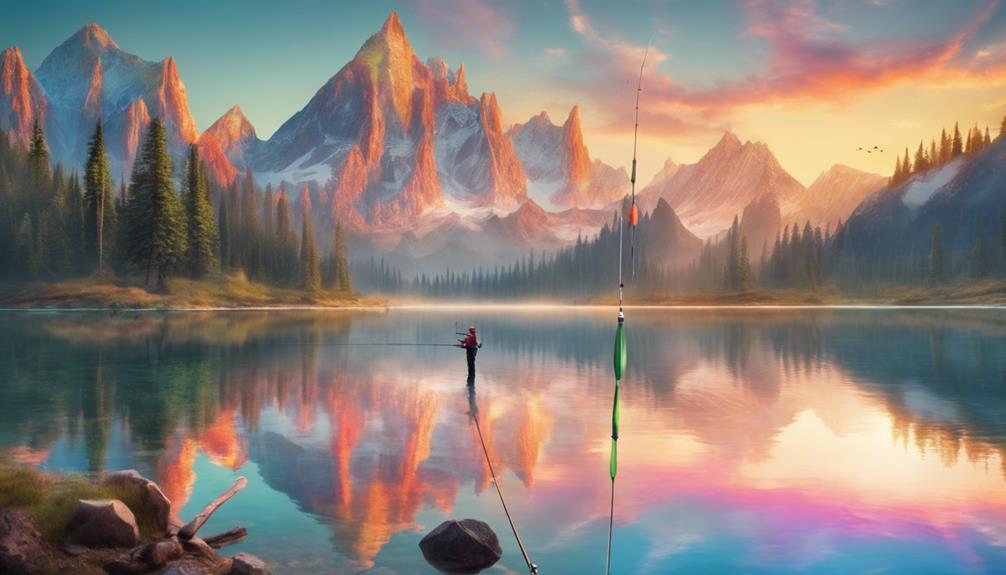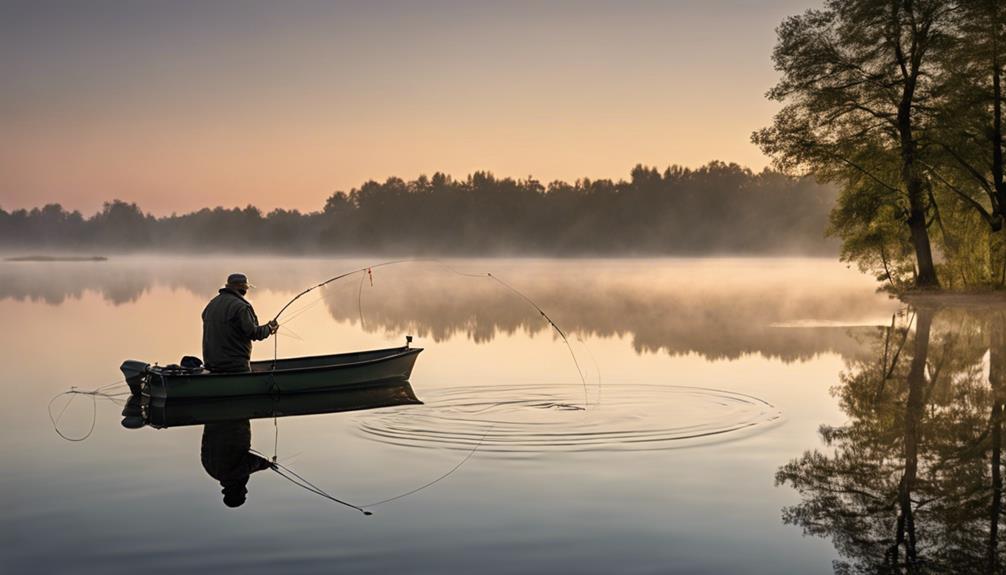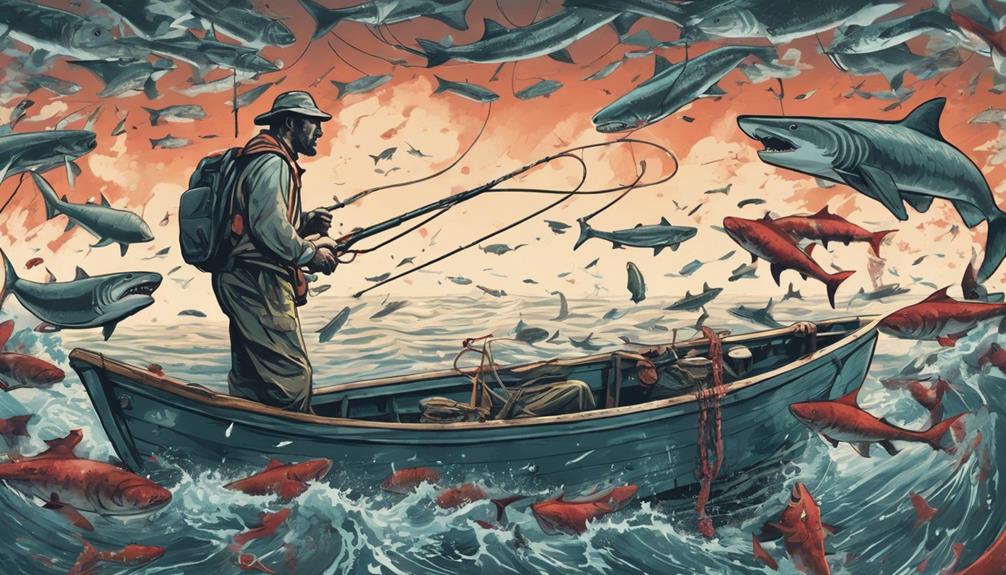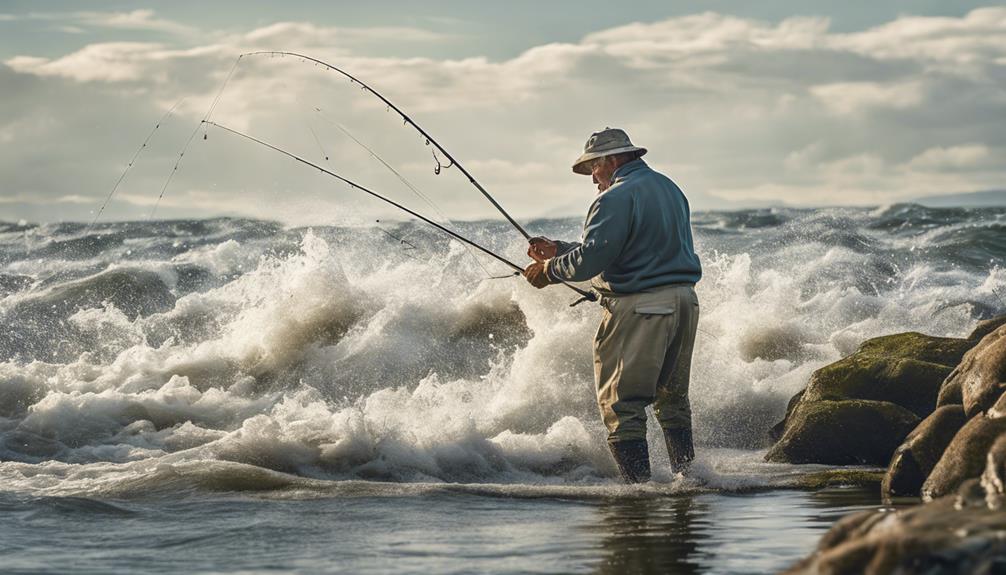Navigating the nuances of high altitude lake fishing can present some unique challenges worth considering. From selecting the appropriate gear to adapting to the ever-changing weather conditions, each aspect plays a crucial role in the success of your fishing venture.
But, there's one tip among the twelve that could make or break your fishing experience – it's all about mastering the art of locating those elusive active fishing spots. Stick around to find out the insider secrets that will elevate your high altitude fishing game to the next level.
Choosing the Right Gear
When gearing up for high altitude lake fishing, ensure your equipment includes lightweight rods and reels for ease of handling in the thin mountain air. Proper gear maintenance and equipment storage are crucial to prolong the lifespan of your fishing equipment. High altitude conditions can be harsh on gear, so regularly clean and lubricate your reels to prevent corrosion and ensure smooth operation. Store your equipment in a dry and ventilated area to avoid moisture build-up, which can damage sensitive parts.
Gear organization is key for a successful fishing trip. Invest in a tackle box with adjustable compartments to keep your lures, hooks, and weights neatly organized. This will save you time on the water and prevent frustration when trying to locate specific items. Prioritize tackle selection based on the fish species you're targeting and the lake's conditions. Lightweight jigs and spoons are ideal for high altitude lake fishing, as they can be easily cast in the thin air and mimic the movement of natural prey.
Understanding High Altitude Conditions
To fish successfully at high altitudes, understanding the unique conditions of mountain lakes is essential. High altitude lakes have lower oxygen levels due to the thinner air, making it important to acclimatize slowly to prevent altitude sickness. As you ascend to fish at higher altitudes, your body needs time to adjust to the reduced oxygen levels, so take it slow and stay hydrated.
Moreover, be prepared for significant temperature fluctuations at high altitudes. Mornings can be chilly, even in the summer, while afternoons might bring intense heat. Dressing in layers is key to staying comfortable throughout the day. Additionally, understanding wind patterns is crucial for high altitude fishing. Mountains can create unpredictable wind conditions that may affect your casting and the movement of fish. Pay attention to the direction of the wind and adjust your casting technique accordingly.
Locating Active Fishing Spots
Understanding the behavior of fish in high altitude lakes is crucial for locating active fishing spots. To increase your chances of a successful fishing trip, consider the following tips:
- Depth Exploration: Fish in high altitude lakes often change their depth preferences based on factors like temperature and available food sources. Use a fish finder or depth gauge to explore different depths and locate where the fish are actively feeding. Pay attention to temperature fluctuations, as fish may move to different depths to find their preferred water temperature.
- Topographic Mapping: High altitude lakes can have complex underwater structures that attract fish. Use topographic maps or underwater sonar to identify drop-offs, ledges, and underwater vegetation where fish are likely to congregate. These structures provide shelter and ambush points for fish, making them ideal spots for fishing.
- Understanding Fish Behavior: Fish behavior can vary throughout the day, so it's essential to adapt your fishing strategy accordingly. For example, fish may be more active during early morning or late evening hours. Observe the water for signs of fish activity such as surface feeding or jumping, which can indicate where the fish are located.
Mastering Casting Techniques
To improve your success in high altitude lake fishing, mastering casting techniques is essential. Improving accuracy and increasing distance in your casts can significantly enhance your chances of hooking that prized catch. When aiming for accuracy, focus on your target and practice your aim. Make sure to release the line smoothly, with just the right amount of force to reach the desired spot. Casting with precision takes practice, so don't get discouraged if it takes time to perfect.
Increasing the distance of your cast can help you reach deeper waters where fish might be more abundant. To achieve greater distance, utilize the proper casting technique. Start by holding the rod comfortably and maintaining a fluid motion throughout the cast. Use the power from your shoulders and wrist to propel the bait or lure further. Remember, it's not just about strength but also about timing and technique.
Another tip to improve your casting skills is to pay attention to the wind conditions. Adjust your casting angle and strength based on the direction and speed of the wind to compensate effectively. By mastering these casting techniques, you'll be better equipped to tackle the challenges of high altitude lake fishing and increase your chances of a successful fishing expedition.
Selecting the Best Baits and Lures
Improving your success in high altitude lake fishing starts with selecting the best baits and lures for the job. When fishing in these picturesque yet challenging environments, you need to consider various factors such as bait selection, lure tactics, weather impact, and water temperature to optimize your chances of a successful catch.
Key Tips for Selecting the Best Baits and Lures:
- Bait Selection: High altitude lakes often have clear water, so using natural baits like worms, insects, or small fish can be very effective. Trout and other fish in these lakes are used to natural prey, making live bait a good choice. Artificial baits that mimic the local baitfish can also work well.
- Lure Tactics: Opt for lures that can be cast long distances to cover more water. Spinners, spoons, and crankbaits are popular choices for high altitude lake fishing. Vary your retrieval speed to see what entices the fish in the specific conditions of the lake.
- Weather Impact and Water Temperature: Pay attention to how the weather conditions and water temperature affect fish behavior. In colder water, fish tend to be more sluggish, so slower presentations may be necessary. Conversely, in warmer water, fish may be more active and willing to chase faster-moving lures. Adapt your bait and lure choices accordingly to match the conditions.
Adapting to Weather Changes
When faced with changing weather conditions during high altitude lake fishing, it's crucial to adapt your strategies to maximize your chances of a successful catch. Weather preparation is key; always check the forecast before heading out and pack appropriate gear. High altitudes can bring sudden temperature shifts, so layering clothing is essential. Be ready to adjust your gear accordingly – from adding or removing layers to switching bait or lures based on weather patterns.
Acclimatization plays a significant role in your fishing experience at high altitudes. Take the time to adjust to the elevation by arriving a day early if possible. This can help prevent altitude sickness and allow you to fish more comfortably. Stay hydrated to combat the effects of high altitude. The air is drier at higher elevations, leading to increased water loss through respiration and evaporation. Carry sufficient water and consider electrolyte drinks to maintain hydration levels.
Incorporating these acclimatization and hydration strategies into your routine won't only make your fishing trip more enjoyable but also enhance your performance on the water. By being prepared for changing weather conditions, making necessary gear adjustments, acclimatizing effectively, and staying hydrated, you'll be better equipped to handle whatever challenges high altitude lake fishing may present.
Handling Fish at High Altitudes
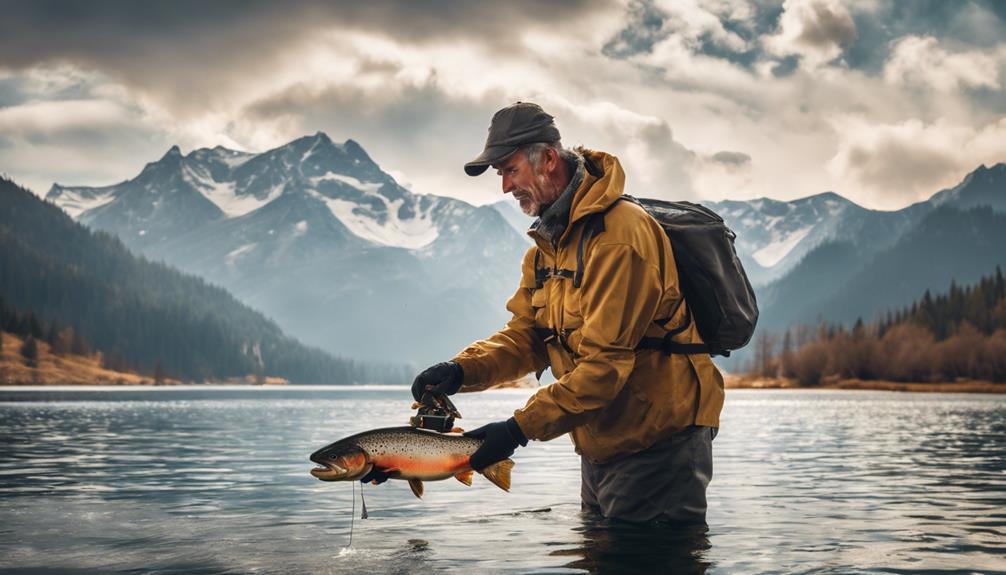
Adjusting your fish handling techniques at high altitudes is crucial to ensure their well-being and your fishing success. Proper handling and conservation methods are essential to maintain fish health and promote sustainable fishing practices in high altitude lakes.
Here are some key tips to help you handle fish effectively in these environments:
- Minimize Air Exposure: High altitude lakes have lower oxygen levels, making fish more susceptible to stress. Limiting the time a fish spends out of water can help reduce the negative impact of low oxygen levels. Avoid excessive handling and release the fish quickly to ensure its well-being.
- Use Barbless Hooks: Barbless hooks are easier to remove and cause less damage to the fish, promoting a quicker and safer release. This helps in preserving fish health and increasing their chances of survival after being caught.
- Support Proper Release Techniques: When releasing a fish back into the water, support its body properly and allow it to swim away on its own. Avoid tossing or dropping the fish back into the lake, as this can injure the fish and decrease its chances of survival. By practicing proper release techniques, you contribute to the conservation of fish populations in high altitude lakes.
Practicing Leave No Trace Ethics
To ensure minimal environmental impact and preserve the natural beauty of high altitude lakes, it's important to practice Leave No Trace ethics while fishing. Responsible angling and environmental awareness are crucial when enjoying these pristine waters. Minimizing impact on the delicate ecosystem ensures that future generations can also appreciate the beauty of these high altitude lakes.
When practicing Leave No Trace ethics, always be mindful of your surroundings. Avoid leaving any trash behind, including fishing lines, hooks, or any other non-biodegradable items. Pack out all your garbage and dispose of it properly to preserve nature's integrity. Remember that even small scraps can have a significant impact on the environment.
Responsible angling goes beyond just cleaning up after yourself. It involves respecting the wildlife and their habitats. Be cautious when navigating the area, so as not to disturb nesting sites or breeding grounds. Keep noise levels to a minimum to maintain the tranquility of the surroundings. By treading lightly and being considerate of the environment, you contribute to the sustainability of high altitude lake ecosystems.
Frequently Asked Questions
Are There Any Specific Regulations or Restrictions for Fishing at High Altitude Lakes?
When fishing at high altitude lakes, it's crucial to be aware of the regulations in place. Make sure you have the proper licensing to fish in these areas.
Conservation and preservation efforts are essential to maintain the delicate ecosystem of these lakes. By following the rules and respecting the environment, you can enjoy your fishing experience while helping to protect the natural beauty of high altitude lakes.
What Are Some Common Safety Precautions to Take When Fishing at High Altitudes?
When fishing at high altitudes, remember to prevent altitude sickness by staying hydrated and acclimating slowly.
Pack essential safety gear like a first aid kit and emergency blanket.
Be prepared for sudden weather changes and have an emergency plan in place.
It's crucial to prioritize your safety above all else when fishing in high altitude areas.
How Do High Altitude Conditions Affect the Behavior of Fish?
At high altitudes, fish behavior can change due to the lower oxygen levels in the water. The fish may swim closer to the surface where oxygen is more abundant.
This can affect your fishing techniques, as you may need to adjust your bait or lure to attract the fish.
Understanding how altitude impacts fish behavior can help you have a more successful fishing trip in high altitude lakes.
Is It Necessary to Bring Any Specialized Equipment for High Altitude Lake Fishing?
When fishing at high altitudes, you need specialized gear for high altitude lake fishing. These tools help you adjust to the unique conditions and increase your chances of a successful catch.
By using the right equipment and adapting your fishing techniques, you can make the most of your high altitude fishing experience.
Don't forget to pack gear that suits the altitude and fishing style for a more enjoyable outing on the lake.
Are There Any Unique Challenges or Obstacles to Consider When Fishing at High Altitudes?
When fishing at high altitudes, you'll face unique challenges like thinner air and unpredictable weather conditions. These factors can affect your fishing experience, making it crucial to be prepared for sudden changes.
Stay alert to signs of altitude sickness and be ready for rapid weather shifts, which can impact safety and catch rates. Adjust your gear and tactics accordingly to handle the obstacles and maximize your success in high altitude lake fishing.
Conclusion
Now that you have the essential tips for high altitude lake fishing, you're ready to tackle any challenges that come your way. Remember to choose the right gear, understand the conditions, locate active spots, master your casting techniques, select the best baits and lures, adapt to weather changes, handle fish properly, and practice Leave No Trace ethics.
With these tips in mind, you'll have a successful and enjoyable fishing experience at high altitudes. Happy fishing!
